Wasp, Hornet & Bee Nest Removal Service
Serving Atlanta Metro | Columbus | Augusta | Savannah
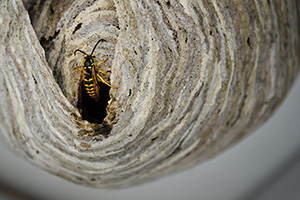
Stinging insects like wasps, hornets, yellow jackets, and even bees can quickly become a hazard when they build nests too close to human activity. Attempting to remove these nests on your own can be dangerous due to the risk of aggressive behavior and painful stings, especially if the nest is disturbed.
Active Pest Control offers nest removal services to help you protect your property and your family.
Don’t put yourself at risk—let our team handle the job with expertise and care. Stinging insect nests, including bee nests, require proper handling to avoid injury and prevent insects from returning!
Call us today and enjoy the peace of mind of knowing you can enjoy your entire property without fear of being stung. Say Goodbye to Pest Problems for Good!
Fill out the form below and we’ll be in touch! *During normal business hours. After hours inquiries will be returned the next business day.Ready for your FREE quote?
When Should You Remove a Wasp, Hornet, Or Bee Nest?
You should consider removing a wasp, hornet, or bee nest as soon as you spot it, especially if it’s located in an area with high human activity. And while some species aren’t aggressive, it can be difficult to tell exactly which type of stinging insect you are dealing with without the help of a professional pest control expert. . Prompt action is essential to minimize the risks that these insects could potentially pose to your family, pets, or visitors.
Having these pests nearby can pose significant dangers, particularly if you have children or pets who play outdoors. A simple disturbance, such as a ball hitting the nest or sudden movement near it, can provoke aggressive behavior, leading to painful and potentially dangerous stings. For those with allergies to stinging insects, even one sting could result in a serious medical emergency.
For safety and efficiency, it’s always best to rely on professional pest control services to remove the nest. Attempting to remove it yourself can provoke the insects, increasing the likelihood of stings and injury.
We recommend professional nest removal if you spot a nest larger than a fist, but it’s also a smart choice for anyone who wants to play it safe with stinging insects on their property, especially if you have kids or pets playing in the area.
Don’t wait—quick action can make a significant difference in protecting your family and property.
Say Goodbye to Pest Problems for Good!
Ready for your FREE quote?
Fill out the form below and we’ll be in touch!
*During normal business hours. After hours inquiries will be returned the next business day.
What Should You Do If You Spot a Nest?
If you spot a nest, try to verify the species it belongs to. Stinging insects are territorial, so if you see a bunch of one type flying around in the area, there’s a good chance that it’s their nest.
If you’re unable to determine the exact species, ask yourself: “Is it a wasp or a bee?” If you can determine that, you can determine what to do next.
Wasp/hornet’s nest:
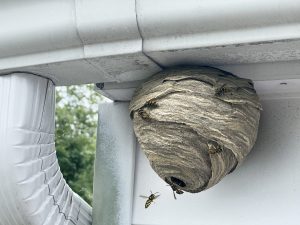
Wasp/hornet
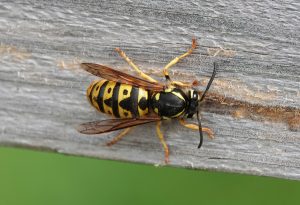
- Wasps and hornets: The biggest clue that it’s a wasp or hornet’s nest is a curved multi-segment body that narrows at the abdomen. People also say that wasps and hornets look “mean.” Since wasps or hornets can be aggressive and will sting to defend their nest, we recommend calling a professional nest removal specialist ASAP.
Bee’s nest:
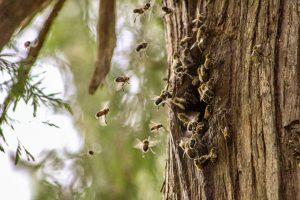
Bee
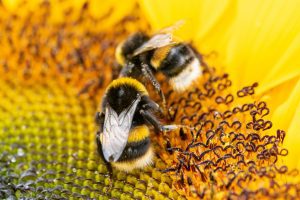
- Bees: Bees have a much more rounded body with fuzzy hairs that allow them to be the most effective pollinators on the planet. People sometimes say bees look “cute” or “friendly.” Bees are not typically aggressive, so removal is not necessary in all cases. If you can tolerate their presence, we recommend keeping them around for the benefits they bring to your yard.
Should You Avoid Removing a Wasp or Hornet Nest?
Deciding whether to remove a wasp or hornet nest isn’t always straightforward. While these stinging insects are often seen as pests, they also play a beneficial role in the environment. Wasps and hornets act as pollinators and natural pest controllers, feeding on other insects that might harm your garden.
However, their territorial and aggressive nature can make them a serious hazard, especially when their nests are located close to human activity.
Here are some factors to consider when weighing the decision to remove a nest:
- Proximity to Your Home or High-Traffic Areas
If the nest is located near doorways, windows, patios, or children’s play areas, the risk of accidental encounters and stings is significantly higher. Removal should be strongly considered in such cases. - Presence of Children or Pets
Kids and pets are more likely to disturb a nest unintentionally, increasing the likelihood of stings. For families, the safety of your loved ones often outweighs the environmental benefits of leaving the nest intact. - Size and Activity of the Colony
Smaller nests that are located far from human activity may not pose an immediate risk and could be left alone. However, larger nests with growing colonies can quickly escalate the danger, as more insects increase the chance of aggressive behavior. - Allergy Risks
If anyone in your household is allergic to stings, the decision becomes clearer. Even a single sting can lead to severe, life-threatening reactions, making nest removal a priority.
In many cases, the risks of keeping a wasp or hornet nest in close proximity to your home outweigh the ecological benefits.
If you’re concerned about the environmental impact of removing pollinators from your property, you should know that wasps and hornets aren’t nearly as effective at pollinating as bees. There are many other insects and birds that are similarly effective as wasps and hornets as pollinators – and much less dangerous.
How to Identify a Wasp, Hornet or Bee Nest
You should take extra care when identifying a nest, as disturbing it—even unintentionally—can provoke aggressive behavior, increasing the risk of painful stings. Try to avoid touching the nest in any way, as there could be stinging insects inside.
Another thing to take note of is the fact that certain wasps and hornets become more aggressive in the late summer and fall months as they seek resources to survive the winter.
Check out our full guide to identifying wasp and hornet nests.
Professional Wasp, Hornet & Bee Nest Removal Service
To sum it up: nest removal should always be handled by a stinging insect exterminator with experience.
Removing a wasp, hornet, or bee nest on your own can be extremely dangerous. Disturbing a nest often triggers aggressive behavior, leading to stings that can be painful or, in some cases, life-threatening—especially if you have an allergy. Attempting DIY removal without the proper tools, expertise, and safety measures puts you at unnecessary risk.
That’s where Active Pest Control comes in. Our professional team has the experience and equipment needed to safely and effectively remove nests from your property all year round. We prioritize your safety and ensure the job is done thoroughly to prevent future infestations – so if nests form again on your property after our nest removal service, you can trust that our technicians will return to your property to safely remove any new nests.
Whether you need a wasp or hornet nest removed, give our team a call today!
Back to Bee, Wasp, & Hornet Exterminators, Control & Removal
FAQs:
What really keeps wasps away?
Eliminate food sources like sugary drinks and trash, and seal any cracks or gaps where they might build nests. Natural deterrents like peppermint oil can help prevent wasps, but professional pest control services provide long-term solutions by safely removing nests and applying preventive treatments.
How do I permanently get rid of wasps?
The most effective way to permanently get rid of wasps is through professional nest removal and treatment. Experts will eliminate the nest and apply preventive measures to stop re-nesting.
Regular maintenance and removing attractants like uncovered food also help prevent wasps from returning.
How do you keep hornets away?
Sealing potential entry points, removing food sources, and using deterrents like peppermint or citronella oil can reduce the chances of hornets nesting in your area Natural deterrents, such as peppermint or citronella oil, can be applied around outdoor areas to create a barrier hornets dislike.
Also, regular inspections of your yard and outdoor structures can help catch early signs of nesting activity.
What discourages hornets?
Hornets are discouraged by strong scents like eucalyptus or peppermint and by eliminating food and water sources. Removing food and water sources, such as uncovered trash, fallen fruit, or standing water, also makes your property less attractive to them.
Regularly inspecting outdoor areas for early signs of nests and sealing gaps or cracks in walls and eaves can prevent hornets from establishing colonies.
How to prevent bees from nesting in your yard?
Seal gaps, remove clutter, and use bee-repellent plants like marigolds to prevent bees from nesting. Bees also dislike strong smells like vinegar and citronella and are less likely to nest in areas with limited shelter.
Our team at Active Pest Control use safe, effective techniques to remove nests while minimizing risks to you, your family, and the environment. Contact us today for bee, wasp or hornet removal.
Wasp, Hornet & Bee Nest Removal Service in Georgia
Serving Your Pest Needs for Over 35 Years Across Georgia
McDonough | Conyers | Lawrenceville | Alpharetta | Marietta | Columbus
Newnan | Locust Grove | Rome | Atlanta | Brunswick | Byron | Augusta | Savannah
Home » Bee, Wasp, & Hornet Exterminators, Control & Removal » Wasp, Hornet & Bee Nest Removal Service
